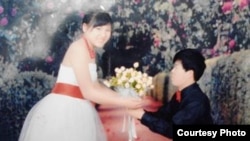A Vietnamese woman has returned home after four years of forced marriage in rural China, forced to make a painful sacrifice for her freedom.
Ly Thi Minh says in April of 2011, three young men invited her and her two sisters to a festival. But once they were alone, she says, there were beaten, threatened and taken across the border into China.
"Then they took us to a house of a Hmong Chinese seven hours away from the border. The owner of this house is a middle-aged man in his early 50s who runs a trafficking business selling Vietnamese women to China. They put us under strict surveillance," she said.
The next morning, her sisters were sold and she was alone. A day later, a couple drove her to Shanxi province, where she was sold to Pay Long Phe, man more than 20 years her senior.
Admission of payment
Pay told VOA he bought her for about $9,400 because he couldn’t afford to marry a local Chinese woman.
"One of my relatives introduced me to the broker since he also got married to a Vietnamese girl through this broker ring," Pay said.
He added the marriage brokers told him Vietnamese wives were obedient and hard-working. But he denied knowing that Minh had been kidnapped.
Now, he just wants her to come back because they have a 18-month-old child.
Hardest decision
Minh, who is only now 18 years old, said she was allowed to return to Vietnam for a visit this year, but only after she had given birth to a baby boy. She said leaving her baby was the hardest decision she's ever made.
"I miss my son, but thinking about how they sold me like a pet or a toy, I feel very sad. The pain of leaving my child behind will be fading with time but I can’t get over the physical and spiritual pain that I have suffered from being kidnapped, beaten, and sold when I was still very young," she said. "That’s why I’ve decided not to go back."
After crossing over, she reported her ordeal to Vietnamese police in Cao Bang province. But it was a story they had already heard from her sister, Sua, who had escaped the same year she was taken.
Sua even identified one of the kidnappers to the police, but the man was released shortly after his arrest, with authorities telling the family there was not enough evidence to hold him.
The police have not responded to VOA's requests for comment.
Ly Thi Sinh, the eldest sister, has not been heard from since being sold for marriage.
Combating trafficking
Thousands of Vietnamese are trafficked abroad every year for marriage or work in the sex industry, prompting the government in Hanoi to launch a high-profile crackdown in 2011, the same year Minh and her sisters were taken.
Vietnam's Public Security Ministry has said it collaborates with its Chinese counterpart to fight human trafficking rings. But it has not said how many people it is able to rescue each year.
Nguyen Dinh Thang, co-founder of the Coalition Against Modern Slavery in Asia (CAMSA), a non-profit organization supporting victims of human trafficking at Vietnam’s borders, said his group is ready to act.
"We are waiting for a little while to see how the Vietnamese government responds. If they take no action, we will then launch a campaign calling for the U.S. government’s intervention," said Thang. "We have alerted the U.S. State Department. The U.S. government assess each country every year in terms of efforts to combat trafficking. Governments that do not cooperate in this fight may be put in tier 3 and subject to sanctions. We believe that with the intervention of the United States, the government of Vietnam will be motivated to be more active in rescuing victims and punishing traffickers."
According to statistics, nearly 1,000 Vietnamese women and children are trafficked and sold abroad each year, mostly to China.
The 2015 Trafficking in Persons Report published by U.S. State Department says Vietnam is “a source country for men, women and children subjected to sex trafficking and forced labor within the country and abroad.”
This report was produced in collaboration with the VOA Vietnamese service.





